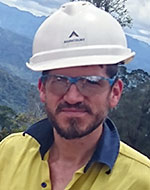
Steven Pearce
Technical Director, Mine Environment Management
Steven is a principal geoscientist with 15 years of industry experience. Steven is currently the technical director of Mine Environment Management which is a specialised technical company that has a focus on the operational and closure planning aspects of mine waste management. Steven has extensive practical and applied experience of the management of tailings and waste rock storage facilities across a broad range of geographical and climatic site settings and commodity types. Stevens field of expertise in applied geoscience is broad and represents an extensive commercial project track record in the fields of mine site geochemistry, mine waste management, mine closure planning, hydrogeology, quantitative risk assessment, fate and transport modelling, contaminated sites, land remediation and landfill. Steven has significant international experience having worked on projects in Scandinavia, UK, Australia, New Zealand, Europe, Africa, Central and Southern America, Canada, Indonesia, Laos, and the Philippines. Steven has a strong research track record and has authored over 20 published papers relating to mine site geochemistry, mine waste management and mine closure planning and has presented widely at international conferences in South America, Africa, Central Asia, China, Europe, UK, Canada, New Zealand and Australia.
Using technology to optimise waste management approaches: methods to improve project economics, reduce risk and demonstrate sustainability.
Incorporating the concept of sustainability and the circular economy as part of long-term waste management planning of mine operations and closure has become an important aspirational target globally in the mining industry, according to Steven Pearce, Technical Director of Mine Environment Management. According to Pearce, “implementing the concept requires both identifying the potential opportunities, meeting numerous technical challenges, and overcoming the inertia that maintains a grip on traditional mining practices. An extremely promising area of optimisation through use of technology is in the manner in which mine waste is classified and managed. MEM has completed site based research that identifies an opportunity for the application of established fragmentation-based technology and processes (currently used to optimise the mining process for ore zones), to the development of the mining plan for waste zones. Use of this established, but still developing, technology provides a number of opportunities to significantly reduce environmental risk and long-term liabilities of mine waste, reduce operational costs, and improve sustainability metrics of mining operations. The implication of applied research work carried out to date is that the manner in which cut off grades for ore and waste are traditionally developed and incorporated into mine plans can be further optimised. By using an optimised approach to the characterisation and management of waste zones there is potential that material with net positive economic resources can be identified and prevented from being inadvertently discarded into waste facilities. Further that low risk waste materials can be better identified and prevented from being managed as high risk, and that high risk materials can be better identified and managed in a lower risk and more cost effective manner.
As part of MINEX Europe 2019 on 25-27 June 2019 in Sofia, Bulgaria, Steven will be giving an address on the dual benefits of using technology to optimise the approach of mining waste to both reduce environmental risks and increase recovery of resources.
